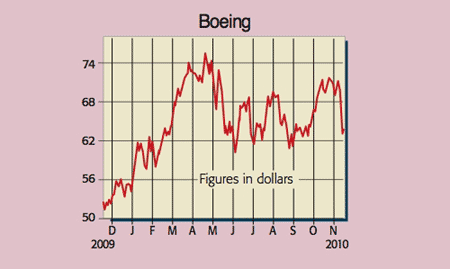
With the Federal Reserve still going full tilt at quantitative easing (QE), the American $13.7trn debt mountain (now equivalent to $44,000 per citizen – higher than Iceland’s), is set to grow. That spells big trouble for the dollar. This is bad news for holders of the greenback. However, front-line US exporters, such as Boeing, are set to cash-in handsomely.
Boeing is the world’s largest manufacturer of commercial aircraft, which make up around 50% of sales, and military aircraft (McDonnell Douglas). It’s also a leading provider of defence and space systems. It operates the Space Shuttle and International Space Station and sells products such as helicopters, missiles, satellites, rocket engines, and advanced communication systems.
As for civilian aviation, Boeing services half of the market for 100-plus seater planes, with the other 50% going to Airbus. Assuming the dollar continues to decline against the euro, Boeing should enjoy a huge cost advantage over its main rival. Better still, despite fears of order cancellations as airlines such as Japan Airlines (Asia’s biggest carrier) go belly-up, the firm’s backlog is gigantic. At $321bn, it’s equivalent to 4.9 times revenues.
Tip of the week: Boeing (NYSE: BA), rated a BUY by Gleacher & Company
Furthermore, the fundamentals of air travel remain intact, with long-term growth rates of 5% a year expected for decades to come. With oil at $85 per barrel and environmental concerns still needing to be addressed, many carriers are being forced to replace their older planes with more efficient ones. All told, these trends of greater mobility, improved fuel consumption and lower pollution, are expected to generate a total demand of 30,900 new planes over the next 20 years (valued at $3.6trn).
Wall Street is forecasting 2010 turnover and underlying earnings per share (EPS) of $64.6bn and $3.99 respectively, rising to $71.5bn and $4.67 in 2011. That puts the stock on a price-to-earnings (p/e) ratio of 13.4 for next year, while also paying a 2.5% dividend yield. This is far too cheap for a group stuffed full of clever technology with leading positions in growth markets. So I would value the stock on a through-cycle earnings before interest, tax, depreciation and amortisation (EBITDA) multiple of 12. After adjusting for the net debt of $2.4bn and $13.5bn in legacy pension/healthcare obligations, that produces an intrinsic value of $83 per share.
So why have the shares been in a tailspin lately, underperforming the S&P 500 by nearly 15% over the past month? The main concerns surround the firm’s defence interests in light of cuts in military budgets. Boeing also still faces challenges with the development of its new super-jumbo, the Dreamliner 787. The aircraft suffered a mid-air fire on a test flight last week and had to make an emergency landing in Texas. The plane has been dogged by delays and cost overruns, but is nevertheless 20% more fuel-efficient than existing models and has won hundreds of orders. Lastly, there are the usual risks of customer defaults (particularly where vendor financing – see page 49 – is in place), safety and terrorist scares, currency fluctuations and labour issues, such as strikes.
All the same, with the dollar set to slide and Airbus hitting problems with its competing A380 plane, Boeing rates as a long-term buy. Gleacher has a $100 target.
Recommendation: BUY at $62.70